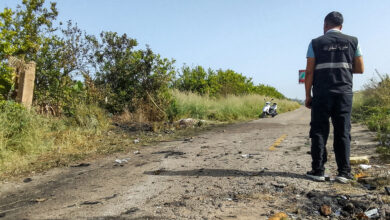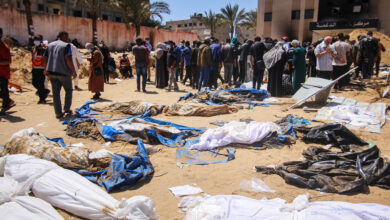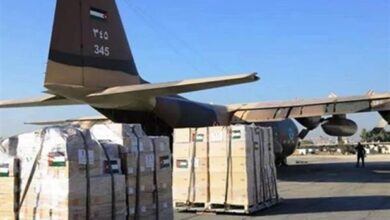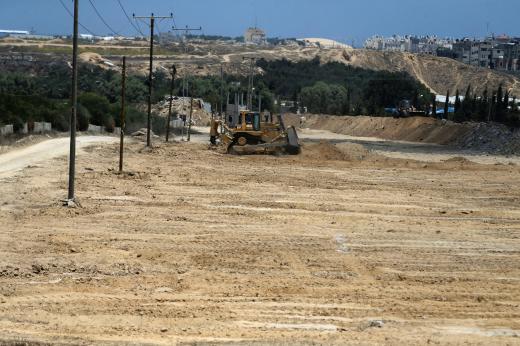
Palestinian militants launched their heaviest barrages against Israel since the 2014 Gaza war on Tuesday and Israeli aircraft struck back, in a surge of fighting after weeks of border violence.
Following militant rocket and mortar launches throughout the day countered by Israeli tank fire and air strikes, the pro-Iran Islamic Jihad militant group said a ceasefire agreement was possible, but Israel said reports of a deal were untrue.
“Palestinian factions will abide by calm as long as (Israel) abides by it,” Islamic Jihad spokesman Daoud Shehab said. An Israeli official who declined to be named said, “The report about a ceasefire is incorrect.”
Israeli sirens warning of imminent rocket and mortar strikes sounded late into the night and Israeli aircraft hit 55 militant targets in the Gaza Strip, including a cross-border tunnel under construction, the military said.
Israel has long said it would not tolerate such attacks. There was no sign that calm would be restored at midnight (21:00 GMT), when the militants said the ceasefire could take effect.
The Israeli military said that by 8 p.m. local time (1700 GMT) militants had fired 70 rockets and mortar bombs into Israel and that three Israeli soldiers were wounded by shrapnel. There were no immediate reports of Palestinian casualties.
The armed wings of Hamas and Islamic Jihad claimed responsibility for the firing and said it was in response to Israel’s killing of dozens of Palestinians since March 30, mainly in Gaza border protests.
“Qassam and Jerusalem Brigades (the groups’ armed wings) announce joint responsibility for bombarding (Israel’s) military installations and settlements near Gaza with dozens of rocket shells throughout the day,” they said in a joint statement.
“It comes in response to Zionist aggression and crimes against our people and our resistance fighters … in addition to war crimes conducted by the enemy every day against our people during the marches of return along the border of Gaza Strip.
“Bombardment for bombardment and blood for blood.”
Hamas has largely abided by a de-facto ceasefire since the 2014 war.
“Threshold of War”
Israeli Prime Minister Benjamin Netanyahu convened security chiefs, and Intelligence Minister Israel Katz said the country was “at the closest point to the threshold of war” since the seven-week conflict with Palestinian militants four years ago.
“If the firing (from Gaza) does not stop, we will have to escalate our responses and it could lead to a deterioration of the situation,” Katz said on Army Radio.
Palestinian President Mahmoud Abbas, who heads the Fatah faction that is dominant in the occupied West Bank and is a bitter rival of Hamas and Islamic Jihad, said Israel had used “vigorous aggression” against Gaza that proved it did not want peace.
Lieutenant-Colonel Jonathan Conricus, a spokesman for the Israel Defense Forces (IDF), said the most extensive strikes from Gaza since the 2014 war had drawn “the largest IDF retaliatory attack” since that conflict.
Several militant projectiles were shot down by Israel’s Iron Dome rocket interceptor system, others landed in empty lots and farmland. One exploded in a kindergarten yard, damaging walls and scattering debris and shrapnel around the playground, about an hour before it was scheduled to open for the day.
Violence has soared along the Gaza frontier in recent weeks, during which 116 Palestinians were killed by Israeli fire at mass demonstrations calling for Palestinians’ right to return to ancestral lands now in Israel.
A Hamas spokesman defended Tuesday’s attacks as a “natural response to Israeli crimes”. An Islamic Jihad spokesman said “the blood of our people is not cheap”.
Explosions in Gaza
Plumes of smoke and dust rose from sites hit in the Israeli air strikes. The explosions shook buildings nearby, causing panic among rush-hour crowds on streets and in markets. The Gazan Ministry of Education said shrapnel from one missile flew into a school.
Nickolay Mladenov, the United Nations’ special coordinator for the Middle East peace process, said he was deeply concerned by “the indiscriminate firing of rockets by Palestinian militants from Gaza toward communities in southern Israel”.
Amid international condemnation of its use of lethal force at the mass demonstrations that began on March 30, Israel said many of the dead were militants and that the army was repelling attacks on the border fence.
Palestinians and their supporters said most of the protesters were unarmed civilians and Israel was using excessive force against them.
Off Gaza’s coast on Tuesday, the Israeli navy intercepted a boat that organizers of the Palestinian border protests launched from the enclave in a challenge to an Israeli maritime blockade.
The military said the vessel was stopped without major incident and was towed to the Israeli port of Ashdod where the 17 people on board would be questioned. The organizer of the boat protest said 14 of the boat’s passengers had been returned by land to Gaza but three were detained.
More than two million Palestinians are packed into the narrow coastal enclave. Israel withdrew its troops and settlers from Gaza in 2005 but, citing security concerns, maintains tight control of its land and sea borders, which has reduced its economy to a state of collapse.
Egypt also restricts movement in and out of Gaza on its border.




